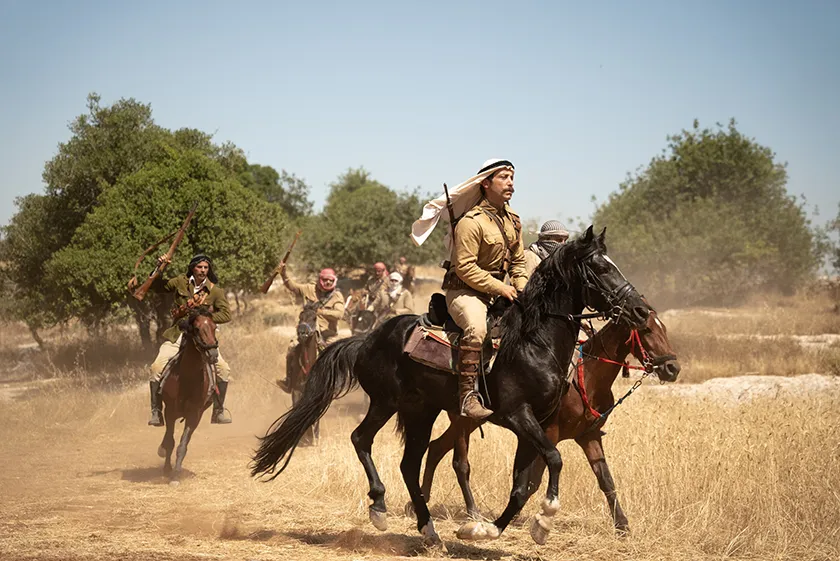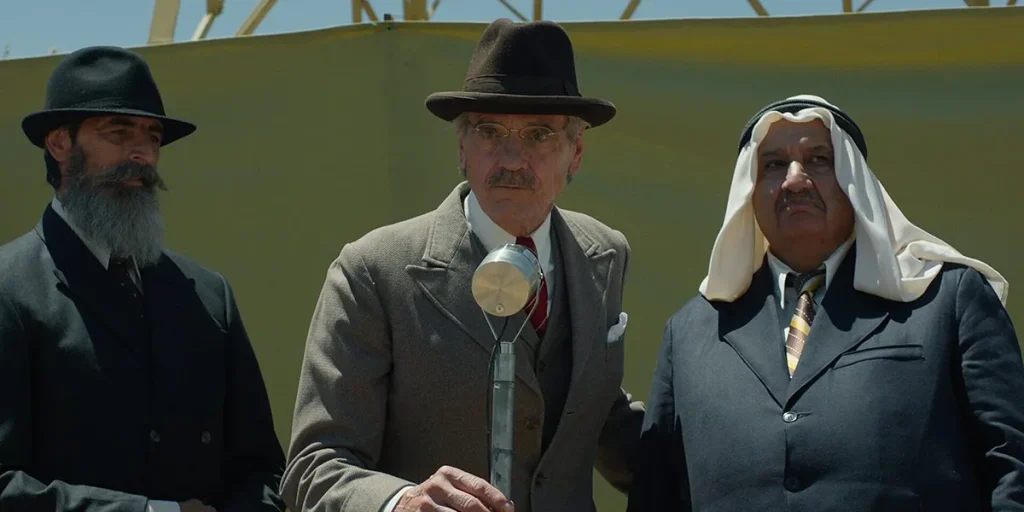Palestine 36 is a poignant historical drama that revisits the country’s painful history of colonialism and resistance.
Writer-Director: Annemarie Jacir
Genre: Historical, War Drama
Run Time: 115′
BFI London Film Festival Screening: October 17-19, 2025
U.S. Release Date: TBA
U.K. Release Date: TBA
Palestine 36 is set in the titular year and country, a time when various rural villages were rebelling against the British colonial rule as the numbers of Jewish immigrants from Europe continued to grow. With unrest quickly spreading and escalating across the country, all the characters in the film must make a choice on where they stand: will they join the revolution or support the British Empire?
In the countryside, where Yusuf (Karim Daoud Anaya) lives, the rebellion groups in the rural villages start moving against the British military, headed by Captain Orde Wingate (Robert Aramayo). In Jerusalem, tensions are also running high, with High Commissioner Wauchope (Jeremy Irons) trying to maintain the interests of the British Empire.
With her latest film, Annemarie Jacir offers an intimate look at the history of the country through its people. The writer-director tells the systemic oppression that the Palestinian people have been subjected to for almost a century through the personal stories of the characters living in the country, which was then under the control of the British Empire. While fictional films do not necessarily have the duty of teaching their viewers about historical matters, Palestine 36 does inform those in the audience who may have not known how far back the oppression of Palestine dates.
From the very beginning of Palestine 36, the characters are singled out very well. While they often share their screentime with others, their intentions and backgrounds are immediately clear and well delivered. The film is at its best in the bigger group scenes where conflicting interests and different opinions come out, showing us that even the people who might want the same outcome for the country have different approaches in how to get there. The ensemble cast works together to deliver powerful performances that help us understand the history of Palestine through the personal experiences of the fictional people the movie explores.

The use of archival footage, especially at the end of Palestine 36, is very fascinating as it further contextualises the film historically by showing us what actually happened in the country between 1936 and 1939. It also reminds us that, while the events that we see on screen may be fictionalised, the horrors that the Palestinian people had to endure were – and still are – very much real. However, the remastering of it is not always successful due its colorization. The shots look too perfect and polished, which ultimately hurts not only their credibility but also their historical resonance. It also took me out of the movie, as I repeatedly wondered where these images had come from, and how much restoring had gone into them.
Even if the ensemble cast works, the film could have benefitted from a clearer central character to anchor its historical retelling into a singular narrative even more. It would have also made it easier for the audience to follow, as the first act can easily feel too introductory with the movie presenting all its protagonists. With so many characters playing a significant role, the viewers are also left wanting for more. A longer runtime could have given the audience more time with all the characters and story that we see in Palestine 36, making the movie the epic historical drama that it set out to be.
Overall, Palestine 36 is a very powerful film that illustrates the history of resistance and rebellion that has distinguished Palestine and its people since the beginning of time. So much so that in 2025, almost 90 years after the events of the movie, the Palestinian people are still not free and are forced to exist under a regime of systemic oppression.
Palestine 36: Movie Plot & Recap
Synopsis:
With the Palestinian Arab Revolt that took place from 1936 to 1939 as a backdrop, the film follows Yussef, a young man who travels between Jerusalem and his home, a rural village that rebels against the British Empire.
Pros:
- The ensemble cast works really well together to deliver a complete and varied picture of Palestine at the time.
- The film spotlights the important history of a country that has always had to fight for its freedom and right to exist.
Cons:
- The film’s runtime is not enough to explore all the characters and plotlines thoroughly.
Palestine 36 will be screened at the BFI London Film Festival on 17-19 October, 2025.

